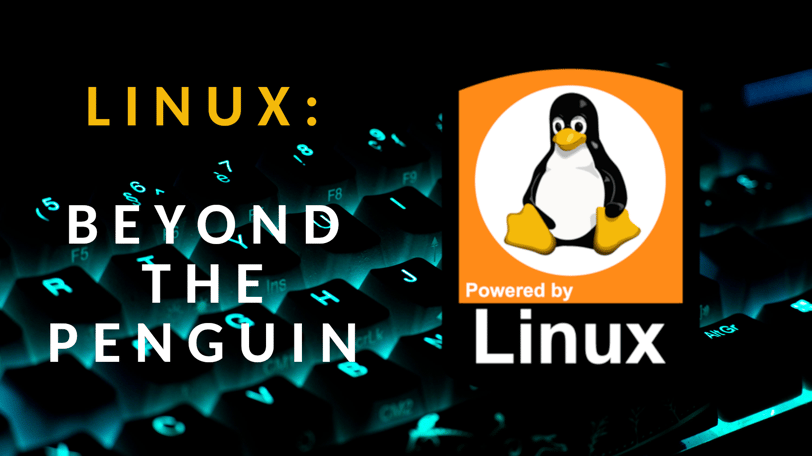Why We Love Linux ? Linux - Beyond the Penguin
TRANSITION TO LINUXUNDERSTANDING LINUX
Abhisek Das
3/28/20244 min read


Whenever we think of an operating system, the first names that often come to mind are Microsoft Windows or Apple's macOS. However, Linux, an open-source powerhouse, is frequently overlooked. Yet, Linux is the foundation of many operating systems, and its impact extends far beyond the tech community. With its rich history, diverse distributions, and innovative philosophy, Linux deserves spotlight.
What is Linux (or GNU/Linux)?
Unlike proprietary systems like Windows or MacOS, Linux (more precisely GNU/Linux) isn't a standalone operating system. Instead, it's a combination of the GNU tools and utilities and the Linux kernel. Together, they form the foundation for countless open-source operating systems we use today.
But what exactly is GNU? And why is the kernel so important? So, let’s break it down.
The GNU Project: Freedom in Software
GNU, a collection of free software and utilities, was initiated by Richard Stallman in 1983. His mission was to create a free version of UNIX, which was proprietary and owned by AT&T at the time. Stallman believed that software should be freely accessible, shareable, and modifiable by anyone. He successfully developed most of the components needed for an operating system—except for one critical piece: the kernel.
The Linux Kernel: The Heart of the System
In 1991, a Finnish computer science student named Linus Torvalds took on the task of building a kernel, the core of an operating system responsible for interacting with hardware and managing essential tasks like memory and file systems. Torvalds’ kernel, combined with Stallman’s GNU utilities, formed the foundation of GNU/Linux.
These projects were united by one powerful principle: Open-source software. Open-source means anyone can view, modify, and share the code. This collaboration has allowed Linux to evolve into a secure, stable, and powerful system that is free for anyone to use.
Key Principles of GNU/Linux
The essence of Linux lies in its four key freedoms:
Freedom to run the program for any purpose.
Freedom to study and modify the program's source code.
Freedom to redistribute copies of the original program.
Freedom to share modified versions of the program.
These freedoms have led to a system that is continuously improved by developers worldwide. Linux is a cornerstone of modern computing, especially in critical sectors like finance, government, and technology.
If you’re curious about the origins of this movement, check out this TED talk by Richard Stallman.
The Power of Open Source: Stability, Security, and Collaboration
One of the major advantages of GNU/Linux is its open-source nature. Thousands of developers and organizations around the globe contribute to its improvement, leading to unparalleled stability and security. Bugs are quickly spotted and fixed, and the system is constantly evolving thanks to the collective effort of its user community.
Because of this, Linux has become a preferred operating system for servers, cloud infrastructure, and even supercomputers. Its security and reliability have earned it a reputation for excellence in environments where uptime and data protection are critical.
Linux Distributions: The Many Flavors of Linux
The beauty of Linux lies in its versatility. When we refer to "Linux," we’re often talking about Linux distributions or distros — complete packages that combine the Linux kernel with various software and utilities. These distros can vary greatly in features, usability, and purpose.
Let’s take a quick look at some of the most popular Linux distributions:
Debian: Known for its stability and security, Debian is one of the oldest Linux distros. It only includes free, open-source software, making it ideal for those who prioritize transparency.
Ubuntu: Built on Debian, Ubuntu is the most popular Linux distro today, especially for beginners. It focuses on user-friendliness and regular updates, making it a great choice for newcomers.
Linux Mint: A distro based on Ubuntu, Mint provides a similar experience but includes proprietary software, making it more media-friendly.
Fedora: Sponsored by Red Hat, Fedora is at the forefront of free software and innovation, often serving as a testing ground for cutting-edge technology.
Red Hat Enterprise Linux (RHEL): A commercial distro used by large enterprises, RHEL is based on Fedora but offers long-term support and stability for mission-critical environments.
Arch Linux: For those who love total control, Arch is the way to go. Lightweight, minimal, and flexible, Arch is designed for advanced users who want to build their OS from the ground up.
Linux’s Business Model: A Community-Driven Powerhouse
The beauty of Linux is that it’s free and open to everyone. Organizations like the Free Software Foundation and Linux Foundation ensure that the project remains non-commercial. Donations and memberships from tech giants like Google, IBM, Intel, and Samsung keep the foundation going, as these companies also benefit from Linux's technological advancements.
While Linux is free for individual users, some distros offer paid support models for businesses. For example, Red Hat offers a subscription-based service to corporations, providing enterprise-level support and updates.
Why Linux Dominates Servers but Not Desktops
Today, Linux powers most servers and runs on the majority of smartphones through Android. It’s also the operating system of choice for supercomputers and IoT devices.
However, Linux still trails behind Windows and MacOS when it comes to desktop use. This gap exists mainly due to Linux not being pre-installed on most consumer computers and the steeper learning curve associated with some distros. But things are changing. As user-friendly distros like Ubuntu and Mint become more polished, Linux is becoming more accessible to everyday users.
Conclusion
Our journey through Linux reveals that it is more than just an operating system — it’s a philosophy rooted in freedom, collaboration, and innovation. From the visionary efforts of Richard Stallman to the tireless work of Linus Torvalds, Linux embodies the power of open-source development.
As we continue our exploration of operating systems, remember that Linux is more than just software. It's a movement that continues to shape the future of computing, one line of code at a time.
